|
|
|
Sort Order |
|
|
|
Items / Page
|
|
|
|
|
|
|
| Srl | Item |
| 1 |
ID:
132561
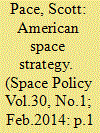

|
|
|
|
|
| Publication |
2014.
|
| Summary/Abstract |
This Viewpoint addresses American space strategy and the choices that lie before US space practitioners. Space activities today play critical roles in U.S. national security, economic growth, and scientific achievements. Satellite communications link the world. The Global Positioning System (GPS) is an integral part of several critical infrastructures, and enables functions ranging from survey and construction, to farming, finance, and air traffic management e not to mention US military forces worldwide. Less well understood is how the GPS time signal provides a global time base for encrypted communications e including point-of-sale transactions with credit or debit cards. Without GPS, much of today's economy would come to a halt. Beyond the Earth, we have rovers on the surface of Mars, and a probe that has left the solar system. The International Space Station represents a unique collaborative
partnership between the United States, Europe, Canada, Japan, and Russia. Spacefaring states are concerned with the long-term sustainability and security of space activities as a result of increasing orbital debris and the proliferation of space capabilities of new national entrants, some of them potential adversaries.
|
|
|
|
|
|
|
|
|
|
|
|
|
|
|
|
| 2 |
ID:
160311
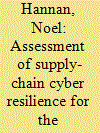

|
|
|
|
|
| Summary/Abstract |
Noel Hannan addresses the subject of supply-chain cyber resilience for the International Space Station (ISS), examining and cross-referencing supply-chain security and the ISS, both relatively new focuses in the domain of cyber security. He concludes that there will be a significant threat from many attack vectors to the ISS in its remaining years of operation.
|
|
|
|
|
|
|
|
|
|
|
|
|
|
|
|
| 3 |
ID:
110168
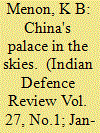

|
|
|
| 4 |
ID:
127512


|
|
|
|
|
| Publication |
2013.
|
| Summary/Abstract |
The envisaged future space research programmes, whether in the field of space exploration or Earth observation are becoming more and more technically complicated and so costly that a single nation can hardly afford to realize them. Major non-European space-faring nations, China and India will progressively play an important role besides US, Russia and Japan. The Space Advisory Group of the European Commission recommended that the European Commission supports within Horizon 2020 a comprehensive Robotic Mars-Exploration Programme under European leadership that should become an essential element of a coordinated international space research programme. The International Space Station (ISS) experience shows that cooperative space programmes build links between industries and laboratories from around the world, which then further develop in non-space related activities, with positive impact on the economy and scientific research. Strategies need to be developed to mitigate the gradual increasing risks incurred by climate change. In order to lower their entry barrier to engage in space emerging and developing space nations need to be included in cooperative space programmes. We present the recommendations of the Space Advisory Group of the European Commission concerning Europe's participation to global space endeavours.
|
|
|
|
|
|
|
|
|
|
|
|
|
|
|
|
| 5 |
ID:
136987
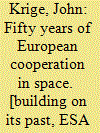

|
|
|
|
|
| Publication |
Paris, Beauchesne, 2014.
|
| Description |
543p.pbk
|
| Series |
Studies in Modern Science and Technology from the International Academy on the History of Science
|
| Contents |
Vol. X
|
| Standard Number |
9782701020297
|
|
|
|
|
|
|
|
|
|
|
|
Copies: C:1/I:0,R:0,Q:0
Circulation
| Accession# | Call# | Current Location | Status | Policy | Location |
| 058166 | 500.5094/KRI 058166 | Main | On Shelf | General | |
|
|
|
|
| 6 |
ID:
105512
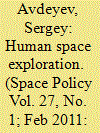

|
|
|
|
|
| Publication |
2011.
|
| Summary/Abstract |
This Viewpoint is a slightly edited version of the 'Statement by Space Explorers on Human Space Exploration' produced in the wake of a workshop organized by the European Space Policy Institute and held in Vienna in May 2010. While noting the cultural differences in understandings of 'exploration' around the world, it also affirms the phenomenon as a globe-wide, human urge, emphasizing that only the physical presence of a human being can assure the full emotional quality of exploration. It calls upon decision makers to regard human space exploration as a global trans-cultural quest that should be supported and furthered.
|
|
|
|
|
|
|
|
|
|
|
|
|
|
|
|
| 7 |
ID:
118486
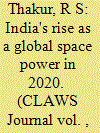

|
|
|
| 8 |
ID:
119884
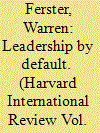

|
|
|
|
|
| Publication |
2011.
|
| Summary/Abstract |
The United States' leadership in space is a natural result of its high standing among the world's democracies and its vast wealth, which enables it to spend more than US$35 billion annually on civil and national security space activity, far surpassing all other nations.
|
|
|
|
|
|
|
|
|
|
|
|
|
|
|
|
| 9 |
ID:
150408


|
|
|
| 10 |
ID:
122531
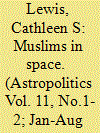

|
|
|
|
|
| Publication |
2013.
|
| Summary/Abstract |
The first men to fly into space precipitated comments about religion and God, but for most of the history of human spaceflight these comments related to Christianity. As International Space Station partners recruit spacefarers from Islamic countries, they face new religious challenges. Islam is distinct from other large monotheistic religions by virtue of the fact that Muslim worship practices require routine attention to Earth geography and astronomy. It is a vantage point that changes in low Earth orbit. Recent Muslim astronauts and cosmonauts have led the way in adapting religious practices to their position above the Earth.
|
|
|
|
|
|
|
|
|
|
|
|
|
|
|
|
| 11 |
ID:
127552
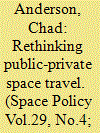

|
|
|
|
|
| Publication |
2013.
|
| Summary/Abstract |
On May 24, 2012 SpaceX's Dragon capsule was launched and in doing so became the first commercially built vehicle to berth with and carry cargo to the International Space Station (ISS). It successfully completed its mission and returned to the Pacific Ocean on May 31, 2012.1 The docking of Dragon represented a historic moment where a commercial enterprise managed to achieve that which had previously only been accomplished by governments. "In the history of spaceflight - only four entities have launched a space capsule into orbit and successfully brought it back to Earth: the United States, Russia, China, and SpaceX".2 While this is a monumental accomplishment for private industry, we cannot ignore the value of public-private partnerships and the role that government played in enabling this incredible achievement.
In this paper I will examine how public-private partnerships are enabling the development of the commercial space industry, viewed through the lens of the Rethinking Business Institutional Hybrid Framework put forward by University of Oxford professors Marc Ventresca and Alex Nichols in their Rethinking Business MBA course. I intend to demonstrate that the NASA versus Commercial Space argument is a false dichotomy and that only by working together can both sectors continue to push the boundaries of space travel and exploration. I plan to do this by first discussing how the NASA-SpaceX partnership came about and the reasoning behind it. I will then explore what a public-private partnership (PPP) is, as compared to other government privatization schemes, and explain why Space Act Agreements are significantly different from anything done previously. I will then analyze the impact of these agreements and outline their benefits in order to demonstrate the value they create, especially in areas of mutual value creation and economic development.
|
|
|
|
|
|
|
|
|
|
|
|
|
|
|
|
| 12 |
ID:
102817
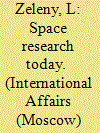

|
|
|
|
|
| Publication |
2011.
|
| Summary/Abstract |
International Affairs: Mr. Zeleny, the U.S. has decided to stop space shuttle flights. Does this mean that the U.S. space program is going through a period of profound change?
Academician Zeleny: Indeed, the Barak Obama administration confirmed in early 2010 its intention to stop space shuttle flights and to replace the Constellation Program by a new strategy in the field of manned space missions. It is planned to attract private firms to the development of technologies for delivering cargoes and astronauts into space and simultaneously to conduct research and development on the space infrastructure of the future, including new-generation rocket engines. And, only 5-10 years later, it was planned to begin work on the construction of a new super-heavy launch vehicle and spaceship for long-distance space flights.
|
|
|
|
|
|
|
|
|
|
|
|
|
|
|
|
| 13 |
ID:
089996
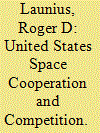

|
|
|
|
|
| Publication |
2009.
|
| Summary/Abstract |
From the very beginning of the space age, the ability to undertake non-military activities in this new regime has been an element of foreign policy. The mirror image twins international cooperation and competition between nation states has driven many of the key decisions in the major programs undertaken by the United States, especially in the evolution of its human spaceflight initiatives. For much of the Cold War era, head-to-head competition with the Soviet Union defined the human program, especially the Apollo program to land astronauts on the Moon. In the aftermath of the Cold War foreign policy objectives still inform the delineation of policy, especially the cooperative nature of large programs such as the International Space Station. This essay explores the evolution of the place assigned international space cooperation and competition in the United States.
|
|
|
|
|
|
|
|
|
|
|
|
|
|
|
|
|
|
|
|
|